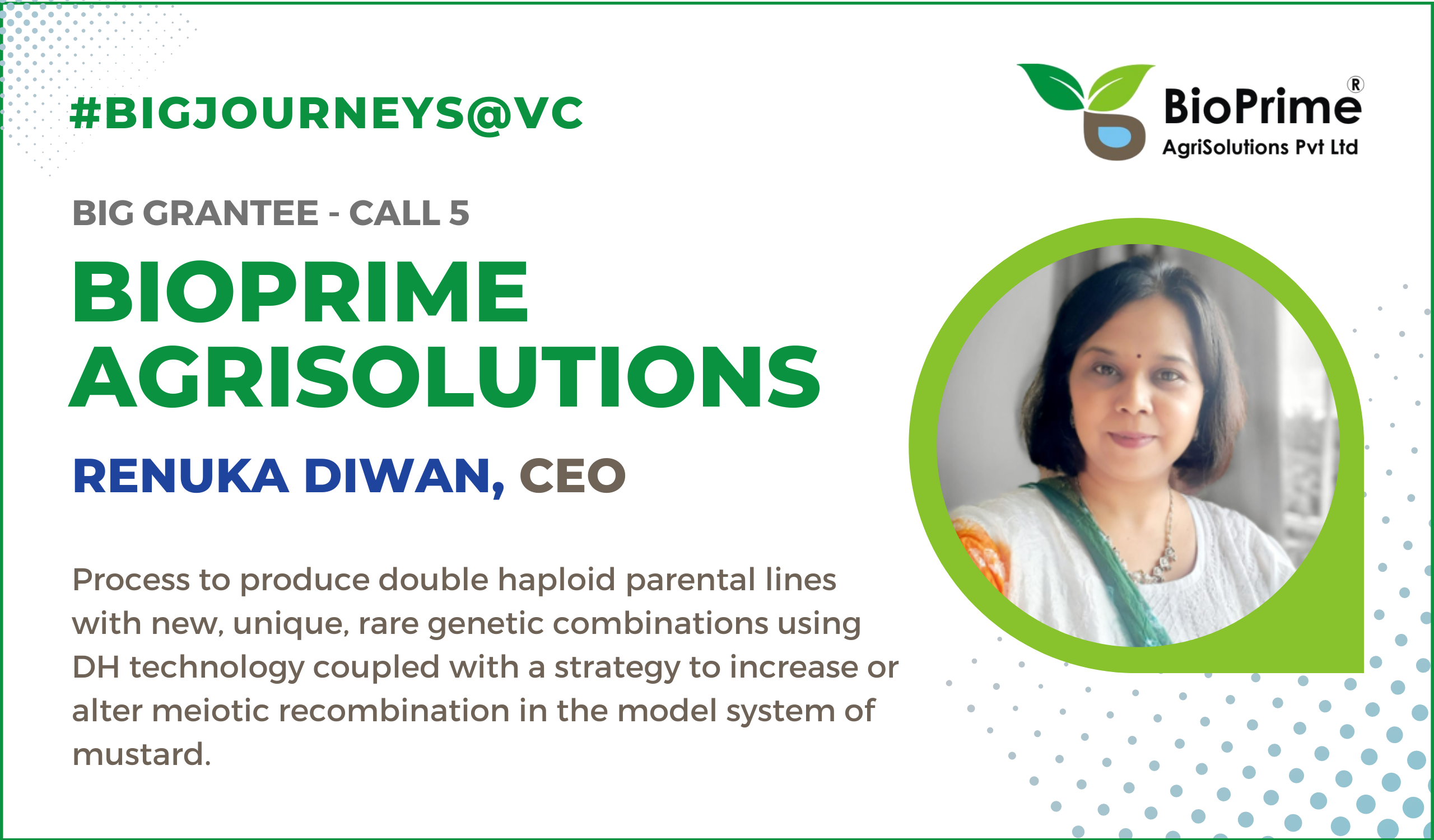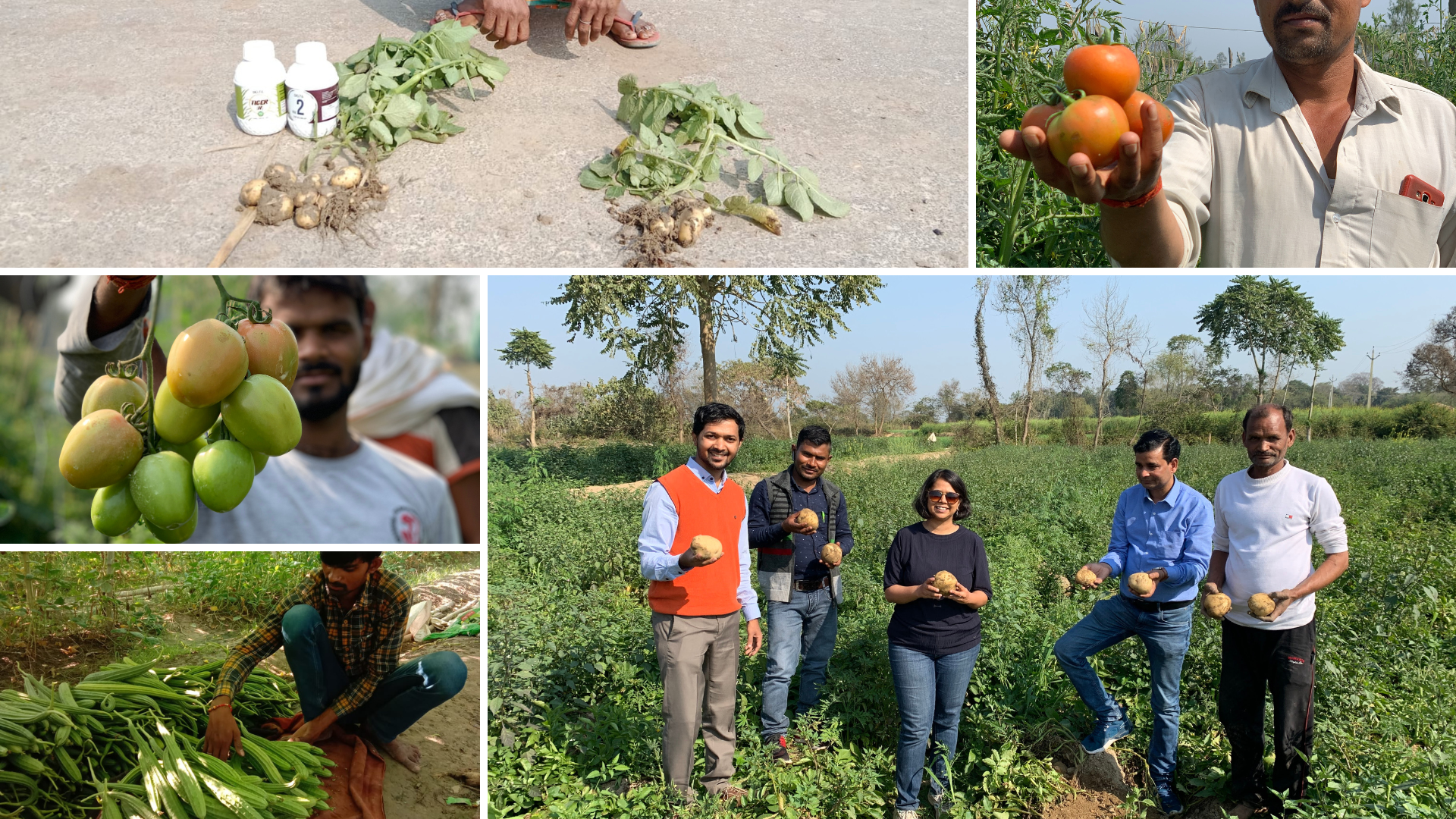In conversation with Renuka Diwan, CEO of Bioprime Agrisolutions
(AUGUST 2022)
Interviewed by N. Ramakrishnan

What is your background and why did you apply for BIG?
I have done my Bachelor’s and Master’s in plant biotechnology and Ph.D in plant sciences from the University of Pune. Then I did my post-doctorate in genetic engineering from the same university. While doing this, I was a visiting faculty at the Institute of Bioinformatics and Biotechnology. After this, I got two women scientists’ positions. I was confused about what I wanted to do, which is when I met Dr. Premnath at Venture Center. He suggested why do we not look at starting something on our own. That got us thinking. I remember telling Dr. Premnath that we don’t know if we have anything that is of commercial importance. I was sure we had nothing that could be converted into a business, but he insisted that we sit down and discuss things. After a couple of hours, he suggested why don’t we look at agriculture and whether any of our work can be used in agriculture. We have been working on plant processes, plant physiology for a long time and that is how the idea of a startup came to us. We applied for the BIG scheme in 2015-16 because this was probably the only proof-of-concept funding that was available. As first-time entrepreneurs and coming from a middle class background, we (Dr. Diwan and her two co-founders – Dr. Shekhar Bosale and Dr. Amit Shinde) were limited in the amount that we could put by ourselves in the business. Biotech business is cost intensive. With the funding and incubation at Venture Center we were able to test out our idea.
What was your BIG proposal?
We come from an academic background. The BIG application was something that was completely different. We very much appreciated the way the application was structured because it made you think of your idea from the perspective of a business. Whether you got the grant or not, you were at least ready with some basic thought process and answers. It was required that you not just think of your idea in terms of how would you prove your idea but also go beyond it and write what would be the possible business case, who would be your clients, what is the kind of money they would give. You have to think through all these things. We are into agriculture biotechnology. We presented an idea for developing molecules that could be used for modulating plant responses. The BIG scheme is for 18 months and the funding is milestone- based. The money is for developing the idea into a proof-of-concept. Even now BIG would be the biggest scheme for biotechnology. I don’t think we have other significant grants even now.

How was your post-BIG journey and what are your BIG plans for the future?
The timeframe was a little tight for us. We had to work extra hard towards the end of the project to develop the proof-of-concept, as 18 months is a short time considering that we are life science students. For projects in MedTech or agriculture, 18 months is really tight. Ideally it should be 24 months with the probability of extension by six months. After the BIG money got over, we were making some revenues. We were selling our formulations thanks to which we had a small stream of revenue coming in. We also won some awards that gave us cash prize and we were able to continue our journey. Later, we got funding from the BIRAC SEED Fund. Then we raised an institutional round from Omnivore and others.
A large part of what our company does is in biologicals. We are simultaneously working on discovering and developing molecules and microbes that can help make crops climate resilient. We started working on biologicals even before the BIG fund. We identified certain molecules that are used by plants as signals. We have three buckets of products. One is stress management, the second bucket of products is for growth and the third is yield enhancers. We are also building a library of microbes. Currently we have about 5,500 microbes and the by the end of the year we will have 15,000 microbes in the collection.
Any advice for aspiring BIG grantees?
One of the most important things that those applying for the grant should remember is that people think this is a small form and that they will be able to fill it in one go. It is not so. I would advice everybody to download the PDF version of the application, go through the entire application first so that they are aware of what kind of questions are being asked. If it is academicians like us who are applying for the grant, they will find it difficult to collect all the data such as business data in a short period of time. It is important to be aware of exactly what questions are asked and there is a word limit because of which you have to construct your answers carefully. My advice would be to prepare a Word document where you have all the information ready. Sometimes the application link times out and you don’t have time to type in your responses. You should type it in Word, keep it ready and just copy and paste the answers.
How did Venture Center help you?
As I said earlier, it was thanks to Venture Center and Dr. Premnath that we even founded our company. We have been associated with Venture Center since our incorporation. We have always benefitted from the advice, guidance and mentorship that they have given. We moved out of Venture Center long back in the sense we are not physically present there, but the guidance, mentorship and support continue. Venture Center then also made an equity investment in BioPrime through the BIRAC SEED Fund and then the BIRAC LEAP Fund. With the SEED Fund, we were able to do market validation, putting the product out in larger quantities in different markets on different crops in different regions. We were also able to use a part of the money for infrastructure development. We used the money from the LEAP Fund to scale up in terms of building our capacity for production, for getting raw materials. Both these funds came at extremely crucial times. We were able to survive in the market because of those funds. It would have been extremely difficult without the funds.
![]()
